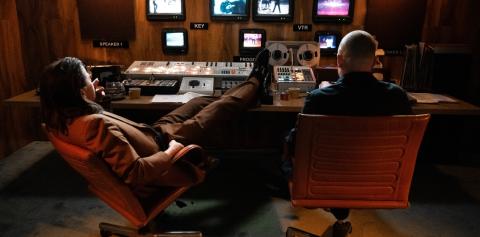Jungle performed “Back on 74” at the 2024 Brit Awards ceremony. Josh Lloyd-Watson never hesitates to answer the same questions repeatedly. It’s all part of the interview game. And God knows that the Londoner has been doing it since he finally dove into the music industry with his childhood friend Tom McFarland. Back in 2013, the two men adopted the strategy of anonymity. No extravagant characters, just two small letters – J and T – which eventually morphed into “Jungle,” a somewhat strange name that has absolutely no connection to the sub-genre of rave culture born in the 90s. Instead, Jungle offers catchy electronic funk that embraces retro soul and, most importantly, a visual element of surprise: in most of their music videos, J and T entrust their brand image to a group of hip-hop dancers in Adidas tracksuits… Their distinctly vintage music remains sunny, dazzling, whimsical, spectacular, flourishing, sometimes, even nauseating. Occasionally criticized for being too clean, Jungle’s cool vibe has resonated through their three studio albums – Jungle (2014), For Ever (2018), and Loving in Stereo (2021) – permeating the airwaves, cinema, and small screen, from the dramatic comedy Magic Mike (within the male stripping milieu) to the opening credits of the French show Quotidien.
Perhaps this is why the British duo departed from fantasy with their new album “Volcano,” described as “rawer and more aggressive,” released on August 11, 2023. A success evidenced by their win at the 44th Brit Awards ceremony this past weekend for “Best Group of the Year.” This victory was made possible by their fourteen-track album, featuring the hit “Back on 74” and collaborations with Brooklyn rapper Erick the Architect (Flatbush Zombies) and the provocative Channel Tres. Meet Josh Lloyd-Watson, one of the two founding members of Jungle.
Interviewer: Tell me, should I really be concerned about the advancements in artificial intelligence? It seems to be all anyone talks about nowadays.
Josh Lloyd-Watson: Let’s just say that like most technologies, there are both pros and cons. Once it’s set in motion, it’s hard to stop the machine. We’ve all seen Westworld and Black Mirror and understood how it could land us in deep trouble. We’re entering a new era, the era of machines, where we can no longer trust anything. Reality is crumbling, and so is art. I’ve actually created a lot with artificial intelligence, you know. Like the interactive videos we recently developed that allow viewers to click on elements or download works in real-time. Nothing to do with NFTs, just for fun. We’ve created 10,000 stamp-shaped visuals featuring the Volcano album artwork. It really makes you question the value of things. Would we have been able to create them without the intervention of AI? Definitely not. It would have taken at least a week to produce just one. Ultimately, the acceleration of artistic content production directly clashes with… its depreciation. And even more so, the depreciation of music. I’m not sure how this will all end, I just feel that danger is looming over us. Platforms like Spotify and others that control the market are already using artificial intelligence. It’s only a step away from them not paying their employees or the artists.
The slow ballads of our second album, clearly not the kind of thing you want to play at a festival.
I believe some artists entirely created by artificial intelligence have already emerged…
Yes, we’ll soon end up with Juno 27, an ultra-sexy imaginary artist. And guess what? Their music will be incredible. We’ll live facing millions of mirrors, looking at ourselves in a way, only listening to what we want to hear because an algorithm has convinced us that’s what we desire. Instead of bringing us together, music will further divide us. The next step will be creating entirely customized music tracks so everyone can enjoy their version.
Your compositions blend pop, funk, soul, and disco. Are you a nostalgic stuck in the past?
It’s an interesting question, one I hadn’t really thought about. I remain convinced that the golden era of music spans from the 50s to the 70s. The 80s introduced a digital dimension that immediately affected all audio processes. Everything became smarter, more cunning, easier. Even reverb became artificial. With these technological advances, everything seemed to sound better, and all musicians appeared better. And we lost the purest, most beautiful sounds. Originally, your recording had to be perfect in the studio. Now, it’s not as crucial, it can be fixed in post-production. Like editing a photograph. With this new album, I believe we’ve thought more about the process. I spent ten years fine-tuning details on my laptop.
When an artist becomes successful and wealthy, they quickly forget what art truly is and get lost in industrial and commercial ventures.
And suddenly, the music enthusiast from the 70s realizes they’ve become a big nerd…
Absolutely. Anyone interested in a composition detail in modern music becomes a nerd. There’s nothing wrong with that. Most contemporary artists have become nerds by default. I’ve heard even Adele has fallen into it. But apparently, she doesn’t care about having a sophisticated microphone, an SM 58 suits her just fine [a classic microphone, often the first choice for beginner musicians due to its affordable price].
I read in your press release: “Jungle pushes its own limits.” What did you mean by that?
We won’t be accused of not trying new things. The best artists have always been those who adapted to their times, like David Bowie, for example. People are tired of hearing the same thing over and over again. When an artist becomes successful and wealthy, they quickly forget what art truly is and get lost in industrial and commercial ventures. But there are still artists who survive without thinking about such things. I recommend checking out what Anish Kumar is doing. His music is great precisely because it’s not his primary activity.
Do you create music for yourself or for others?
I believe mostly for myself. In any case, I wouldn’t be able to release a track if I didn’t already appreciate it myself. Some tracks on this new album sparked doubt in our minds. I particularly think of “You Ain’t No Celebrity” [the seventh track on the album]. We wondered if it was really… us. And then, after listening to it again with a clear head, we realized it might be the most authentic thing we’ve ever done. Because it’s aggressive, raw with emotion. There’s a lot more passion, pain, and frustration in this album. After the success of very sunny tracks like “Keep Moving,” we wanted to experiment with new forms of performance. And between us, the slow ballads of our second album, that’s clearly not the kind of thing you want to play at a festival.
You’ve often incorporated choirs into your music creations. Where does this fascination with vocal layers come from?
It stems from the early days of Jungle. At the time, Tom and I realized we clearly couldn’t do it all alone. However, that didn’t stop us from continuing, if anything, it inspired us to. But the question inevitably arose, “Well then, who’s going to sing?” The answer was pretty obvious: “Let’s both sing!” So we started layering our voices, overlaying melodies. Over time, we added to it….

![GARBAGE un unico concerto a Milano in giugno [info e Biglietti]](https://www.wecb.fm/wp-content/uploads/2024/03/1709547954_GARBAGE-a-single-concert-in-Milan-in-June-info-and-150x150.jpg)



